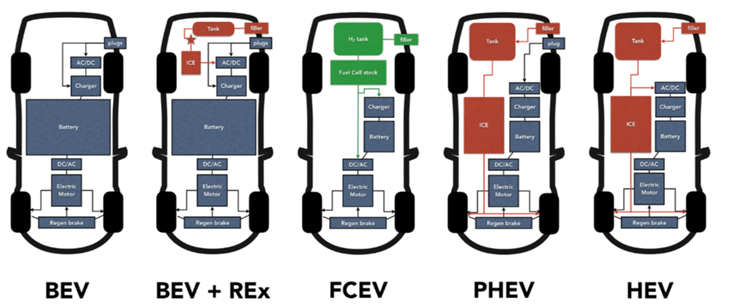Electric Vehicle & EV Charging Station
An electric vehicle (EV) is one that runs on electricity rather than an internal-combustion engine that burns a mixture of gasoline and gases to generate power. As a result, such a vehicle is being considered as a viable replacement for current-generation automobiles to solve issues such as growing pollution, global warming, natural resource depletion, and so on. Even though the concept of electric vehicles has been around for a long time, it has sparked a lot of attention in the last decade as the carbon footprint and other environmental implications of gasoline-powered vehicles have increased.
It can be powered by a collector system that uses electricity from outside the vehicle, or it can be fuelled by a battery that runs on its own (sometimes charged by solar panels, or by converting fuel to electricity using fuel cells or a generator). Road and rail cars, surface and undersea watercraft, electric aeroplanes, and electric spacecraft are all examples of electric vehicles.
Due to technology advancements and a greater focus on renewable energy and the possible reduction of transportation’s influence on climate change, air pollution, and other environmental challenges in the twenty-first century, EVs have seen a renaissance. Electric vehicles are one of the 100 best current ideas for combating climate change, according to Project Drawdown.
Difference Between Electric Vehicles

EV charging station, also known as an electric vehicle charger or electric vehicle supply equipment (EVSE), is a piece of equipment that provides electrical power to plug-in electric automobiles (including hybrids, neighbourhood electric vehicles, trucks, buses, and others).
Even though batteries can only be charged with DC power, most electric vehicles contain an inbuilt AC-to-DC converter that allows them to be plugged into a typical household AC outlet. “AC charging stations” are low-cost, low-power public charging stations that provide AC power. Most completely electric vehicles can operate on both AC and DC electricity.
Connectors that comply to a range of standards are available at charging stations. Multiple connectors are typically seen on DC charging stations, allowing them to power a wide range of automobiles. Typically, public charging stations can be found on the street or in retail shopping complexes, government buildings, and other parking locations.

